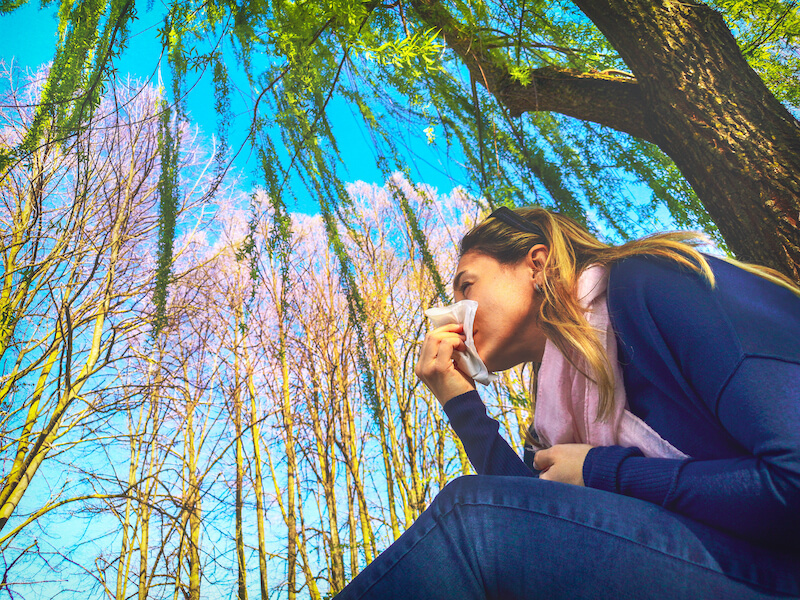Ah, Spring! After a long winter, it’s wonderful to finally open those windows, take a breath of fresh air… and start sneezing. Okay, that sneezing part isn’t so fun. But there’s no denying the reality: allergy season is upon us.
In a general sense, allergy season lasts from March to October of any given year. Does that mean you’ve got nine months of runny noses and itchy eyes to look forward to? Well, not necessarily. And there are a couple of reasons why you might have some relief to look forward to.
What Are Seasonal Allergies?
When we talk about “allergy season,” it’s usually in reference to, well, seasonal allergies. To better explain what seasonal allergies are, let’s back up just a bit and briefly talk about what causes allergies in general. In general, an allergic reaction happens when your body mistakes a harmless substance for something dangerous, activating your immune system in an attempt to protect you.
This results in a variety of symptoms, though the most common are those “cold-like” symptoms we often associate with seasonal allergies: sneezing, runny noses, coughing, itchy eyes, and so on. Depending on the allergen, people may also experience swelling, difficulty breathing, or more serious symptoms.
Now, the human body can be allergic to just about anything. But it’s quite common for people to be allergic to outdoor particulates, such as pollen or mold spores. Because those pollens (or spores or other particles) tend to appear seasonally (every spring, for example), you end up with allergy symptoms that also appear seasonally: hence, seasonal allergies.
Planning the 2022 Allergy Season
So what can you expect for the 2022 allergy season? The easiest way to generate realistic expectations might be to look at the year on a monthly basis.
April Allergies
If you find yourself sneezing and coughing during April, the responsible party may actually be the trees outside your window. For many, this is surprising because we don’t typically think of trees as producing anything other than, well, leaves. But trees are pollinating plants, too!
Different species of trees will pollinate during different times of the spring, so if you find the first few weeks of April particularly challenging, it’s because you might be allergic to Ash trees or Maple trees, and that dictates when you start sneezing. Typically, the best way to control your symptoms during these months is to monitor the daily pollen count (usually you can find this on any weather app or the local news) and stay in when the count gets too high.
May and June Allergies
The next set of allergenic plants usually start flowering in May and June. Typically, these pollens come from grasses and flowers. Because of the ample amount of rain that occurs during April, May, and June, these pollens are usually quite potent and widespread. This means that if you’re allergic to these green grasses and flowering plants, May and June will likely produce prolonged symptoms.
Usually, these pollens reach their peak around the early afternoon, so if you’re symptomatic and have to go outside to get some yard work done, plan to do so during the morning or evening hours.
In July, You Might Get a Break
July tends to be one of the drier months. This means you may actually experience a break from allergy symptoms. Of course, this will vary from year to year and depend significantly on local weather patterns. Still, if you have to plan that outdoor family reunion, July might be the best time to do it!
Allergies for August Through October
Don’t let July lull you into a false sense of security. That’s because August ushers in the beginning of ragweed season. Also known as “hay fever,” ragweed allergies are incredibly common.
What’s more, ragweed tends to last a while. You could be dealing with this particular allergen all the way through to October. Of course, ragweed isn’t the only allergen that sticks around until the ground freezes. Mold allergens can also be quite pervasive at this time of year, too.
How to Combat Seasonal Allergies
Controlling your seasonal allergies can be a challenge. You can try to use the timing of your symptoms to figure out which particular pollens are making your sneeze and itch. But you may have to consult with an allergist or ENT to really figure out the source of your allergies.
Still, knowing which pollens are most potent when can help you determine how to structure your year–that’s true for the 2022 allergy season and it will still be true for the 2023 allergy season. You can expect a little bit of variation from year to year (in general, allergy seasons seem like they’re getting longer and more severe all the time), but keep an eye on your local and regional weather conditions, too.
Just because you have seasonal allergies doesn’t mean you can’t enjoy the great outdoors. Though, it might mean you’ll benefit from a little extra planning (and maybe an antihistamine).
References
https://www.mayoclinic.org/diseases-conditions/allergies/symptoms-causes/syc-20351497#:~:text=Common%20allergy%20triggers%20include%3A,from%20a%20bee%20or%20wasp



